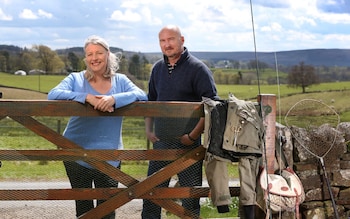When a Tory donor met Mark Carney for the first time at a glitzy business event in New York, he was distinctly impressed.
“He was very credible, very experienced, very thoughtful – and our politics were similar,” the financier recalls.
It was not long after that meeting of minds that the pair both started backing Labour.
While the ex-Tory donor began giving the opposition money, what the former Bank of England governor has given Labour are connections and credibility.
Carney made a star appearance at Labour’s Party conference last year in a video in which he gushed over Rachel Reeves, the shadow chancellor.
“Rachel Reeves is a serious economist. She began her career at the Bank of England, so she understands the big picture,” he said in the clip.
“But, crucially she understands the economics of work, of place and family. And, look, it is beyond time we put her energy and ideas into action.”
Sources close to Labour officials say that Carney’s endorsement was considered the ultimate prize in the race to position themselves as the party of business ahead of a general election.
“Reeves’ team couldn’t believe his wholehearted endorsement at the Labour conference – the video was a total bonus, way beyond expectations,” a person close to the party says.
“I think they were hoping for an endorsement of policies but got a far bigger personal and political one.”
For a former governor, the shift from public servant to party political player is unusual. Lord King, Carney’s predecessor, took a seat in the Lords as a crossbench peer after leaving the Bank, declining to back any party.
Last week it was announced he would take up a new role as president of Marylebone Cricket Club. Eddie George, governor until 2003, similarly took a peerage without party affiliation and a range of City jobs.
A person who has worked with Carney points out that the former banker has always had distinctly political instincts. As recently as November the Canadian said he was considering a bid to replace Justin Trudeau as head of his country’s Liberal Party.
“Given he clearly has ambitions in the Canadian Liberal Party, it is a pretty natural alignment,” the former Carney colleague said.
While Carney and Reeves never overlapped at the Bank of England, the pair have known each other for years, according to sources close to the Labour shadow cabinet minister.
The strong bond between Reeves and Carney can be traced back to 2016 when the then-governor was under serious pressure from Brexit-backing Conservatives amid the intense referendum campaign.
Facing hostile questions from pro-Leave parliamentarians, Carney found Reeves coming to his defence.
“If anyone’s reputation has been damaged there, I do not think it is the Bank of England’s,” Reeves said in a Treasury Select Committee hearing in May 2016 following Sir Jacob Rees-Mogg’s hostile questioning of Carney.
She then offered him the opportunity to set out what he saw as the economic dangers of voting to leave the EU, which he obliged, warning of everything from weaker growth to lower incomes to higher mortgage costs.
“Our bottom line is that there is likely material slowing in growth and likely notable increase in inflation,” Carney told MPs.
However, Carney was not viewed as overtly Labour-leaning when he was leaving the Bank. As prime minister, Boris Johnson appointed him financial adviser for the COP26 summit in 2020, months before Carney was due to step down at the Bank of England.
The appointment reflected the fact that Carney had cultivated expertise on climate finance while governor. He often spoke publicly about the topic and, in 2017, the Bank became a founding member of the Network of Central Banks and Supervisors for Greening the Financial System under his leadership.
Reeves has now appointed Carney to a taskforce examining how to set up a national wealth fund geared towards investment in green industries.
The proposed fund is a crucial part of Labour’s efforts to boost green investment at a time when the public finances are tight. The fund will invest a relatively modest amount of taxpayers’ money in green projects alongside far larger sums of private sector cash.
To do so will require the backing of major private investors. Here, Carney’s contacts book could prove invaluable.
As well as advising Labour, the former Bank governor is chairman of Brookfield Asset Management, a Canadian business that manages more than $900bn of money and has launched major new green funds in recent years.
Elsewhere, Carney serves on the global advisory board of bond fund giant PIMCO, alongside former Labour prime minister Gordon Brown, and on the foundation board of the World Economic Forum, which organises the annual Davos gathering of the global elite. Reeves took to the stage at the flagship event this year.
Labour sources play down suggestions Carney is a constant source of advice for the shadow chancellor – they point to the fact that he has a wide range of jobs that place demands on his time.
But the power of the former Bank governor’s support should not be understated, says the millionaire former Tory donor.
Although the financier decided to stop bankrolling the Tories before Carney gave his dramatic endorsement, the backing gave him comfort in his decision to switch as it made Labour look like a serious government-in-waiting.
“It’s an important endorsement, it’s not a surprising endorsement if you read and listen to what Carney says – he’s what I’d describe as a social democrat, which is what I am. I think that’s the best way to describe Labour today,” the donor says.
“For me to see Carney endorse Rachel and the party is helpful.”
Disclaimer: The copyright of this article belongs to the original author. Reposting this article is solely for the purpose of information dissemination and does not constitute any investment advice. If there is any infringement, please contact us immediately. We will make corrections or deletions as necessary. Thank you.



